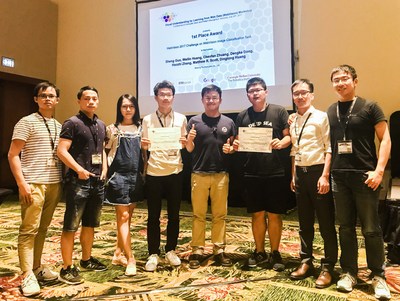China AI Startup Malong Technologies Wins WebVision Challenge
Press Releases
Jul 27, 2017
Malong bested Snap Inc and more than 100 competitors from around the world in a new artificial intelligence contest, which tests how well a computer can learn without additional human supervision
HONOLULU, Hawaii, July 27, 2017 /PRNewswire/ — In the wake of last week’s news about China’s commitment to the artificial intelligence community, Malong Technologies is earning its place as a standard-bearer for China’s new wave of promising AI companies. At CVPR 2017, the premier annual computer vision scientific conference, Malong Technologies was announced as the winner of the first WebVision challenge. The company invented an AI algorithm which learns directly from the web’s massive noisy data to perform as well as people can on an image identification test.

Today’s artificial intelligence revolution is powered by a technique known as “deep learning.” Although this approach performs outstandingly well, it has one major drawback: it’s extremely data hungry. But not just any type of data will do, today’s systems require refined, human-annotated data. Just like a parched castaway who might exasperatingly look towards the ocean to quench his or her thirst, computer scientists have been frustratingly looking to the vast sea of data on the Internet to satisfy the demands of deep learning. But just as one cannot drink from the ocean directly without desalination, today’s popular deep learning algorithms too cannot intake web data directly without refinement by human-annotation – a slow, expensive and laborious process.
For years, the ImageNet dataset has been used as a benchmark for evaluating computer vision algorithms at large scale. It’s labor intensive effort is notable: it took nearly 50,000 people over two years to annotate its millions of images. Based on this dataset, the ImageNet Large Scale Visual Recognition Challenge (ILSVRC) was created for testing the latest and greatest computer vision algorithms – by challenging the computer to classify an unforeseen image into 1,000 different common categories, from dogs to airplanes.
In 2017, the ImageNet challenge was retired. A successor has arrived – named WebVision – held in conjunction with the premier academic conference in the computer vision field called CVPR, organized and supported by ETH Zurich, Google and CMU. The WebVision challenge also tasks a computer program to categorize images into the same 1,000 categories as the ImageNet challenge; however, it has one major difference. Unlike the “clean” data (human-annotated and balanced) of ImageNet, the WebVision challenge uses “noisy” data (no additional annotation or balancing by people) from the web. Specifically, the WebVision dataset contains 2.4 million of images, and accompanied raw metadata, crawled from the Flickr website and Google Images search – and provided to algorithms for testing as-is, e.g. no human-annotated refinement or editing done.
At the CVPR conference, the WebVision 2017 Challenge results were announced: the first prize winner was Malong Technologies. The team at Malong put forth a “semi-supervised” deep learning algorithm capable of consuming large-scale noisy data and producing results that bested all competitors by a large-margin, even reaching performance on par with human beings on the same classification task.
Malong’s performance reached 94.78% accuracy. For reference, human performance has been measured between 94% to 94.9% on the same task. Malong Technologies bested more than 100 competitors from around the world, including a team from Snap Inc., which finished third. The second-place winner achieved 92.25%, which puts Malong ahead by over 2.5 points, a wide-margin in the deep learning community.
Malong has incorporated this core technology broadly across their offerings such as ProductAI.com, a “RetailAI” product recognition cloud platform which can enable any business or developer to visually recognize (search and tag) products including fashion, furniture, textiles, cars, wine and more for online e-commerce and offline in-store or IoT scenarios. The company also offers microscopic and x-ray level product recognition for manufacturing quality checking and bagging scanning scenarios. Their technical breakthrough in semi-supervised learning enables the company to provide their customers with higher accuracy than what the market currently offers by being able to train larger scale models by leveraging the massive abundance of noisy web data — now the new fuel for deep learning.
The company also intends to contribute back to the research community by releasing more information about their technique through scientific publications at world-class computer vision conferences and journals. Malong plans to keep researching and advancing the state-of-the-art in semi-supervised large-scale deep learning going forward.
Established in 2014, Malong consists of former staff of Microsoft Research, Google and Oxford’s VGG. They just won a new G20 contest for entrepreneurs in Germany three weeks ago. They have more than $10m in venture funding, and received backing from Microsoft Ventures Accelerator. The company has a joint AI research lab with Tsinghua University and offices in Shenzhen and Beijing, China. Malong’s vision is to transform traditional industries with AI, beginning with retail, manufacturing, and security, to enable higher efficiency, quality, and a safer world.
For more information contact:
Tiffany Hu
+86-130-5131-3630
[email protected]
www.productai.com
Official WebVision Challenge results:
http://www.vision.ee.ethz.ch/webvision/challenge_results.html
View original content with multimedia:http://www.prnewswire.com/news-releases/china-ai-startup-malong-technologies-wins-webvision-challenge-300495534.html
SOURCE Malong Technologies Co., Ltd.


